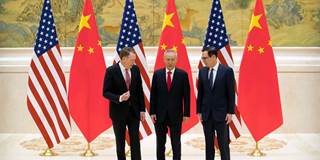If the US and China fail to reach a comprehensive trade agreement, bilateral trade will plummet, and the unraveling of the US-China economic relationship would accelerate. But even if an agreement is reached, that unraveling will continue, because, at its core, the trade war has always been about security.
WASHINGTON, DC – As Chinese and American trade negotiators meet in Washington to try to forge an accord on trade, observers are largely focused on the countries’ economic disagreements, such as over China’s subsidies to its state-owned enterprises. But to think that an agreement on trade will protect the world from a Sino-American cold war would be as premature as it would be naïve.
Of course, a trade deal is highly desirable. The collapse of trade talks would trigger a new round of tariff hikes (from 10% to 25%, on $200 billion of Chinese goods exported to the United States), driving down global equity prices and spurring businesses to move more of their activities out of China. Amid tit-for-tat tariffs, bilateral trade would plummet, and the unraveling of the US-China economic relationship would accelerate, creating widespread uncertainty and higher costs.
But even if a comprehensive agreement is reached – either before March 1 or a few months from now – that unraveling will continue, albeit in a more gradual and less costly way. The reason – which many investors and corporate executives have failed to recognize – is that the trade war is not fundamentally about trade at all; rather, it is a manifestation of the escalating strategic competition between the two powers.

WASHINGTON, DC – As Chinese and American trade negotiators meet in Washington to try to forge an accord on trade, observers are largely focused on the countries’ economic disagreements, such as over China’s subsidies to its state-owned enterprises. But to think that an agreement on trade will protect the world from a Sino-American cold war would be as premature as it would be naïve.
Of course, a trade deal is highly desirable. The collapse of trade talks would trigger a new round of tariff hikes (from 10% to 25%, on $200 billion of Chinese goods exported to the United States), driving down global equity prices and spurring businesses to move more of their activities out of China. Amid tit-for-tat tariffs, bilateral trade would plummet, and the unraveling of the US-China economic relationship would accelerate, creating widespread uncertainty and higher costs.
But even if a comprehensive agreement is reached – either before March 1 or a few months from now – that unraveling will continue, albeit in a more gradual and less costly way. The reason – which many investors and corporate executives have failed to recognize – is that the trade war is not fundamentally about trade at all; rather, it is a manifestation of the escalating strategic competition between the two powers.